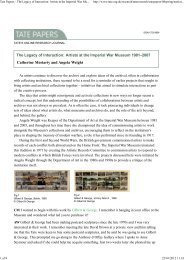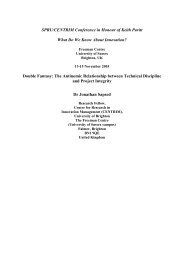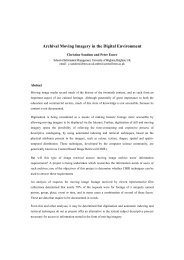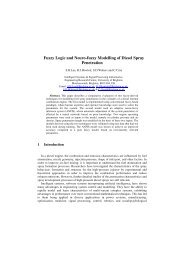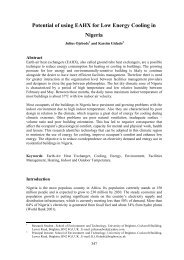TOP TIP - University of Brighton Repository
TOP TIP - University of Brighton Repository
TOP TIP - University of Brighton Repository
Create successful ePaper yourself
Turn your PDF publications into a flip-book with our unique Google optimized e-Paper software.
1<br />
Getting PROMISING PRACTICE<br />
started<br />
In our research, we asked practitioners what they thought were the key<br />
issues or practice tips when setting-up and carrying out work with young<br />
fathers. With this knowledge, we hope that developing young fathers work<br />
may start at steps three or four, rather than beginning at step one.<br />
Working with young fathers<br />
Work with young fathers<br />
has particular challenges.<br />
Negative beliefs about young<br />
fathers, lack <strong>of</strong> funding, difficulties<br />
engaging young men, low confidence<br />
in working with young men, and<br />
cultural barriers are just some <strong>of</strong> the<br />
issues those working with young<br />
fathers face. Perhaps the most<br />
common concern reported by the<br />
projects and organisations we have<br />
spoken with is the lack <strong>of</strong> sustained<br />
funding for work with young fathers.<br />
The short-term and irregular nature <strong>of</strong><br />
funding can lead to low staff morale<br />
and difficulty in long term planning<br />
especially in relation to partnership<br />
working. Setting-up support for young<br />
fathers can take a long time to get<br />
started and when it does, or is just<br />
about to, funding runs out and the<br />
work stops, <strong>of</strong>ten meaning valuable<br />
learning is lost.<br />
But there is no need for doom and<br />
gloom. Some projects and agencies say<br />
that with careful focused planning,<br />
starting young fathers work is not<br />
always as difficult as it first appears.<br />
The Health Initiatives Team at<br />
Education Leeds that works with<br />
school-age fathers, suggests that<br />
projects do not need vast amounts <strong>of</strong><br />
money to start making headway;<br />
rather an understanding <strong>of</strong> young fathers<br />
needs, a commitment to the cause, the<br />
ability to be flexible and a willingness to<br />
challenge unhelpful pr<strong>of</strong>essional<br />
attitudes towards young men.<br />
Similarly, T-BAG in Halifax runs a<br />
mixed support group for young<br />
mothers and fathers aged 16-25 years.<br />
Provision is built upon already existing<br />
services, meaning costs are kept to a<br />
minimum as premises are already there<br />
and staff time is incorporated within<br />
existing job roles (see In Focus, p14).<br />
B2b+ in Sunderland got started in their<br />
work with young fathers following the<br />
recognition that there were large and<br />
5. Throughout this guide we attempt to differentiate between specific young fathers projects, and agencies and organisations delivering<br />
(or wanting to promote appropriate) services for young fathers. Consequently, we use both sets <strong>of</strong> terms (i.e. project, and<br />
agency/organisation) to avoid overly simplistic suppositions about the kinds <strong>of</strong> young fathers work in question.<br />
‘Young fathers<br />
work doesn’t<br />
need to be<br />
anything<br />
special - it’s<br />
just about<br />
recognising<br />
and<br />
understanding<br />
their needs –<br />
then<br />
addressing<br />
them.’<br />
Supporting Young Fathers 13



